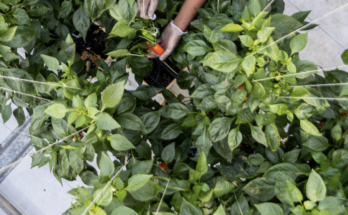GM crops are genetically engineered crops which undergo gene alteration and modification. The gene of plants are artificially modified, usually by inserting genetic material from another organism, in order to give it new properties, such as increased yield, herbicide tolerance, resistance to disease or drought, or improved nutritional value. Earlier, India had approved the commercial cultivation of only one GM crop, i.e. Bt-cotton, but now Genetic Engineering Appraisal Committee (GEAC) has recommended GM mustard for commercial use. GM mustard is technically known as DMH11 (Dhara Mustard Hybrid 11). It is a genetically engineered crop where a scientific process is carried out using the Bar-Barnase-Barstar gene system to create a mustard hybrid. The Bar gene confers the herbicide tolerant (HT) trait in GM mustard. Meanwhile, the field trials carried out by the Indian Council of Agricultural Research (ICAR) for the DMH-11 variety showed an average 28 per cent yield increase over existing varieties.
You may also like to read – Preventing Bt-Cotton from Pink Bollworm: A Tale of Telangana
India’s edible oils import is rising continuously to meet the growing domestic demand. During 2021-22, India registered a growth of 34.18 per cent in its edible oil import bill, we spent ₹1.57 lakh crore on the import of 14.1 million metric tonnes (MMT) of edible oils. India imported majorly palm, soybean, sunflower and canola oils, which is equivalent to two-thirds of our total edible oil consumption of 21 MMT. Therefore, self-sufficiency in edible oil is essentially required to reduce the forex drain on agri-import.
India produces around nine oilseed crops in both Kharif and Rabi seasons. However, the oilseed productivity in India is much lower than the global productivity of these oilseed crops. The oilseeds which are crushed to produce edible oils are soybean, mustard, groundnut, sesame, sunflower, safflower, niger and linseed. During 2020-21, the sowing area under oilseeds crop in India was 28.8 million hectares and total production was 35.9 MMT while the productivity was only 1247 kg/ha, which is way lower than the global productivity average.
You may also like read: GEAC approval to GM mustard paves way for the transformation of Indian agriculture
Meanwhile, the edible oil recovery is only about 8 MMT from the total oilseeds produced. The share of domestic edible oil production is only 38 per cent of the total annual edible oil requirement of 21 MMT. The supply-demand gap is likely to get widen in the future as the demand for cooking oil has been increasing year-on-year, with projected demand at 29.05 MMT by 2029-2030. In India, mustard is an important oilseed crop grown on 9.17 million hectares with a total production of 11.75 MMT. However, this crop suffers from low productivity (1281 Kg/ha) as compared to the global average (2041 kg/ha). In Canada, where GM mustard is cultivated, the productivity is about 2370 kg/ha which is 85 per cent higher than in India. Hence, a technological breakthrough is needed for enhancing the productivity of oilseed crops in general and Indian mustard in particular in the country. GM mustard would help increase the yield of mustard crops which in turn would increase the edible oil availability in India and decrease the dependency on edible oil imports up to a certain extent.
(The author is the Senior VP (Supply Chain) at Origo Commodities India. Views expressed in the article are author’s own.)





